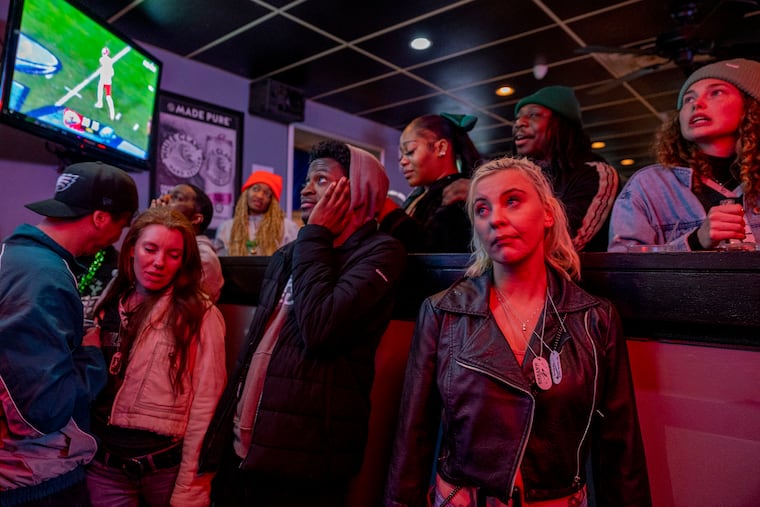How to help your kid process the Eagles’ Super Bowl loss
Philadelphia’s kids are having a tough time after the Birds Super Bowl loss. These tips can help them, and older fans.

Disappointment and heartbreak are long-held traditions for Eagles fans, but younger followers of the Birds got used to a better life. The Eagles made it to the playoffs five times in the past six years — twice going all the way to the Super Bowl.
But on Sunday night, children and teens who watched the game were initiated into the pain that comes with being a Philadelphia fan. (Though they may have gotten a taste already, if their household follows the Phillies or the city’s professional soccer team, the Union.)
» READ MORE: Eagles fans were ready to party. They experienced ‘heartbreak’ instead.
Seth, a 3-year-old from outside Cape May, was upset when he heard that the Eagles lost. Crying in his car seat Monday morning he told his mother, Jess Schelling, “this is the Eagles’ fault,” according to the video she uploaded to Twitter.
“I told him we were all feeling sad but that they played a good game and we’ll be back again next year,” she told The Inquirer via Twitter direct message. “Then we sang the fight song.”
Seth might be among the youngest of upset fans, but he is not alone. Parents shared with The Inquirer stories of children and teens who, in a moment of despair, vowed to never watch or play football again. Others were so inconsolable they couldn’t fall asleep in their own beds.
How best to respond to a child grieving a loss? Two positive psychology experts — who happen to be married to each other and have a grieving 12-year-old Eagles fan of their own — share advice.
Let them be sad
Don’t try to fix it.
In the past, when her son Liam was upset, Suzann Pileggi Pawelski immediately “rushed to the positivity” by saying something like “it’s not so bad.”
The positive psychology specialist and co-author of Happy Together: Using the Science of Positive Psychology to Build Love That Lasts took a different approach last night after the Eagles loss. Her son was upset, and she let him be sad, his father quietly by his side.
“It’s OK to be sad,” she said. “You have to give yourself time to, not wallow in it, but acknowledge the emotion.”
Jumping to put a positive spin on a situation may give the impression you’re dismissing their emotions.
Stick to the program
Maintain routine, even if your kid isn’t into it.
Some kids and teens didn’t want to go to school the day after the game, while others might object to participating in their afternoon activities. That’s a normal response for anyone when they are sad, but parents and caretakers can help by maintaining the routine. Being active can keep kids from dwelling on their sadness.
“It’s important to get back on schedule,” Pileggi Pawelski said. “Continue those activities that normally bring [your child] joy.”
» READ MORE: Gratitude isn’t just polite. A Philly-born psychology movement shows it is a path to happiness.
Check in with them
Don’t assume they are still sad — or that they are already over it.
People process emotions at different rates, said James Pawelski, a professor of positive psychology at the University of Pennsylvania and a coauthor of Happy Together. Instead of having a game plan when picking up your child from school that assumes they will still be sad, listen to them to find out what’s on their mind.
“Listen, be attuned, try to understand where [your] kids are at,” he said. “Some kids might have had a great day at school and want to chat about other things ... other kids, [the loss] might be weighing on them.”
Listen to Jalen
He nailed the positive psychology approach in his postgame remarks.
Allowing yourself to be sad, staying connected to the people around you, and when the time comes, learning from it are the ingredients that Pawelski identifies when working through the emotions that come with loss. Those were also the ingredients of Jalen Hurts’ remarks after the Super Bowl, and Pawelski says younger fans should watch the video clip.
“It’s tough,” Hurts said. “We’ll sit back. We’ll reflect on it. We’ll learn from it.”